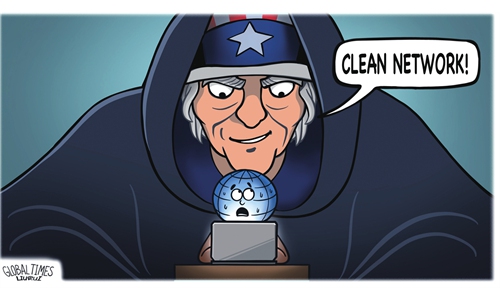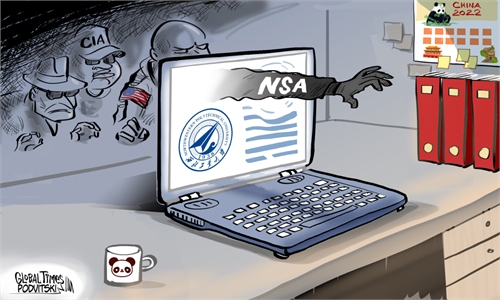Claiming hackers linked to Chinese govt stole US COVID relief benefits ‘ridiculous, old trick’

cyber attack Photo:VCG
Chinese cybersecurity experts on Tuesday slammed a report that claims hackers linked to the Chinese government stole millions in US COVID-19 relief benefits, saying that such an accusation is ridiculous and an apparent old trick to divert domestic attention from the recent “Twitter Files” controversy related to US President Joe Biden.US broadcaster NBC news reported on Monday that hackers linked to the Chinese government stole at least $20 million in US COVID-19 relief benefits, including Small Business Administration loans and unemployment insurance funds in over a dozen states, citing the US Secret Service.
The report said that US law enforcement officials and cybersecurity experts believed the theft of taxpayer funds by the Chengdu-based hacking group known as APT41 was the first instance of pandemic fraud tied to foreign, state-sponsored cybercriminals that the US government has acknowledged such claims publicly, but this may just be the tip of the iceberg.
Shen Yi, director of the Research Institution for Global Cyberspace Governance at Fudan University, told the Global Times on Tuesday that it is hilarious to hear some US officials find such a “new” excuse to smear China.
“As the world’s second-largest economy, is it necessary for the Chinese government to steal money from the US government?” Shen mocked.
The expert stressed that the Chinese government has never and will never instruct any hacker organization to attack other governments as the country firmly opposes and cracks down on hacker attacks of all forms in accordance with the law, still less will it encourage, support or connive in hacker attacks.
It is not the first time that the US accuses the Chinese government of supporting the so-called APT41 hacker group to launch cyberattacks against the country.
A report issued by US cybersecurity company Mandiant in March claimed that APT41, supported by the Chinese government, had infiltrated six – and likely more – state governments using back doors in popular softwares, and it was exfiltrating data on US citizens.
The report did not identify the state or motive behind the hack, but VOA reported that APT41 was motivated by traditional espionage as well as financial gain.
Chinese Foreign Ministry spokesperson Zhao Lijian responded at that time that the US has long used the issue of cybersecurity as a tool for stigmatization, political manipulation and spreading disinformation. China urges the US to take an objective and rational attitude toward cybersecurity and jointly address the challenge of hacking through dialogue and cooperation on the basis of mutual respect.
“The US has never offered any explanation about Chinese cybersecurity companies’ discloses of its attacks against China, while continuing to spread disinformation about China through various means in an attempt to divert the attention of the international community,” Zhao said. “Such a tactic of ‘the thief is crying to stop a thief’ will not succeed.”
The previous reports, the Global Times has revealed how US military and government cyber agencies have remotely stolen more than 97 billion pieces of global internet data and 124 billion phone records in the last 30 days and various spy tools deployed by the US’ NSA, which are capable of lurking in a victim's computer to access sensitive information, controlling global internet equipment and stealing large amounts of user information.
Shen pointed out that the report is an apparent attempt to divert domestic attention in the US from the recent Biden files scandal.
On Friday evening, Twitter’s new owner Elon Musk promoted a leak of documents on his personal account, which the website Politico claimed was the latest sign that the tech billionaire continues to steer the platform in a direction more favorable to conservatives and libertarians. The internal company discussions offer insight on the dissent and confusion inside Twitter as it responded to the New York Post’s reporting on Hunter Biden’s files in the closing weeks of the last presidential campaign.



